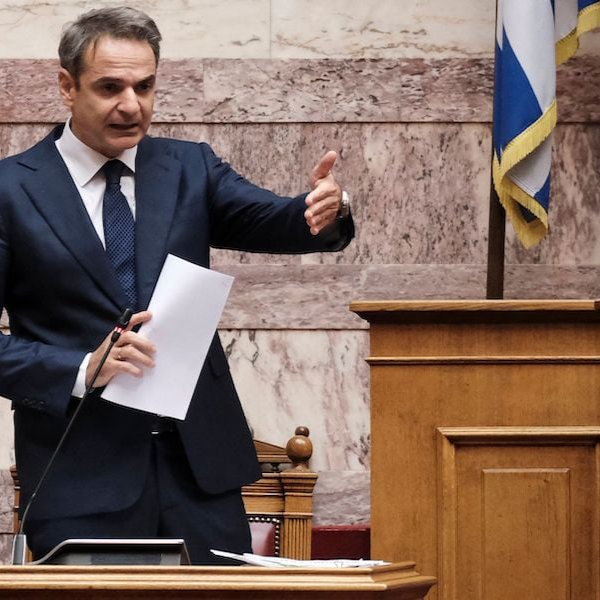
The ongoing wiretapping scandal in Greece, now referred to as the “Greek Watergate,” has created significant political turmoil, further exposing the internal contradictions within the New Democracy government and the broader bourgeois establishment. This scandal highlights not only the deepening crisis of the Greek political system but also reflects the wider economic and socio-political challenges confronting Greek capitalism, which align with the broader historical crisis of global capitalism.
The most recent development in the scandal centers around the findings of the Authority for Communication Security and Privacy (ADAE), which has confirmed several wiretapping incidents conducted by Greece’s secret services under the direct supervision of Prime Minister Kyriakos Mitsotakis. These revelations have intensified scrutiny of the government, with ongoing investigations still uncovering more details about the extent of these covert activities.
In response to these allegations, the government’s reaction has been swift and defensive. It initially directed criticism toward ADAE President Christos Rammos, and government spokesperson Yiannis Economou issued statements downplaying the significance of the findings. Prior to this, there were systematic efforts to obstruct the ADAE’s investigation, culminating in a controversial legal opinion from Chief Prosecutor Isidoros Dogiakos. This legal opinion, widely criticized as unconstitutional, sought to block ADAE’s authority to investigate telecommunications companies and uncover the surveillance activities of intelligence agencies. Dogiakos also threatened ADAE members, including Rammos, with imprisonment. This aggressive and legally questionable maneuver has drawn sharp criticism from legal experts, both in Greece and internationally, including from the European Parliament’s PEGA committee, which has repeatedly called for full transparency and even involvement of Europol in the investigation.
In the early stages of the scandal, the government and its media allies attempted to deflect attention by focusing on other issues, such as fabricating political controversies with Turkey, in an attempt to divert the public’s focus away from the wiretapping revelations. However, these tactics have not succeeded in quelling the growing unrest, as the seriousness of the scandal continues to erode the government’s credibility.
Within the ruling class, there has been a discreet but noticeable distancing from Prime Minister Mitsotakis. Prominent politicians, journalists, and business figures—many of whom are integral to Greece’s capitalist establishment—have begun to criticize the government’s handling of the situation. Notably, even the leadership of PASOK-KINAL, whose leader Nikos Androulakis was one of the first politicians revealed to have been under surveillance, has adopted a hostile stance toward the government. Members of New Democracy and various political commentators have similarly expressed open dissatisfaction, recognizing that Mitsotakis’ tenure may soon come to an end. However, the ruling class is hoping for a smooth transition, either through a restructured victory in the upcoming elections or a change in leadership following a potential electoral defeat.
Despite these internal rifts, criticism of the Mitsotakis government has remained somewhat measured, reflecting the ruling class’s broader concerns about maintaining stability. Open fractures within the political elite could potentially embolden Greece’s labor movement and youth activists, many of whom have been galvanized by the failure of the SYRIZA government in 2015 but have shown signs of renewed political engagement. This cautious balancing act is evident in the conservative yet persistent calls from major bourgeois media outlets, such as the newspaper Kathimerini, which has advocated for a thorough investigation into the scandal to prevent further “political uncertainty.”
The revelation of wiretapping activities is not solely about the surveillance of politicians and media figures. It exposes a much larger, systemic issue within the state apparatus. The secret services, having legally monitored thousands of individuals over the past two decades, have routinely used surveillance techniques as a tool to suppress political dissent and monitor labor and youth movements. The recent wiretapping of establishment figures is merely the visible tip of a much larger iceberg, and it underscores the true focus of the state’s surveillance apparatus: the working class and its allies.
It is crucial to note that the labor movement represents the only social force with both the motivation and the capacity to challenge these undemocratic practices and defend civil liberties in a meaningful way. While sections of the ruling class may fall victim to internal surveillance, the overall interests of this class align with maintaining repressive state measures as a safeguard for their political and economic power. These surveillance practices, rooted in anti-democratic methods, are essential for preserving the capitalist system and the rule of the bourgeoisie.
In conclusion, the wiretapping scandal in Greece is a manifestation of the broader crisis afflicting the capitalist state. The contradictions within the political establishment, highlighted by the scandal, have the potential to incite greater mobilization among the working class and youth. These groups must now recognize that the path to defending democratic rights lies not within the capitalist state but in organizing collectively to challenge the structures of power that rely on such repressive measures. The working class, through its solidarity and collective action, holds the key to ending the government’s slide toward authoritarianism and upholding democratic freedoms in both word and practice.

